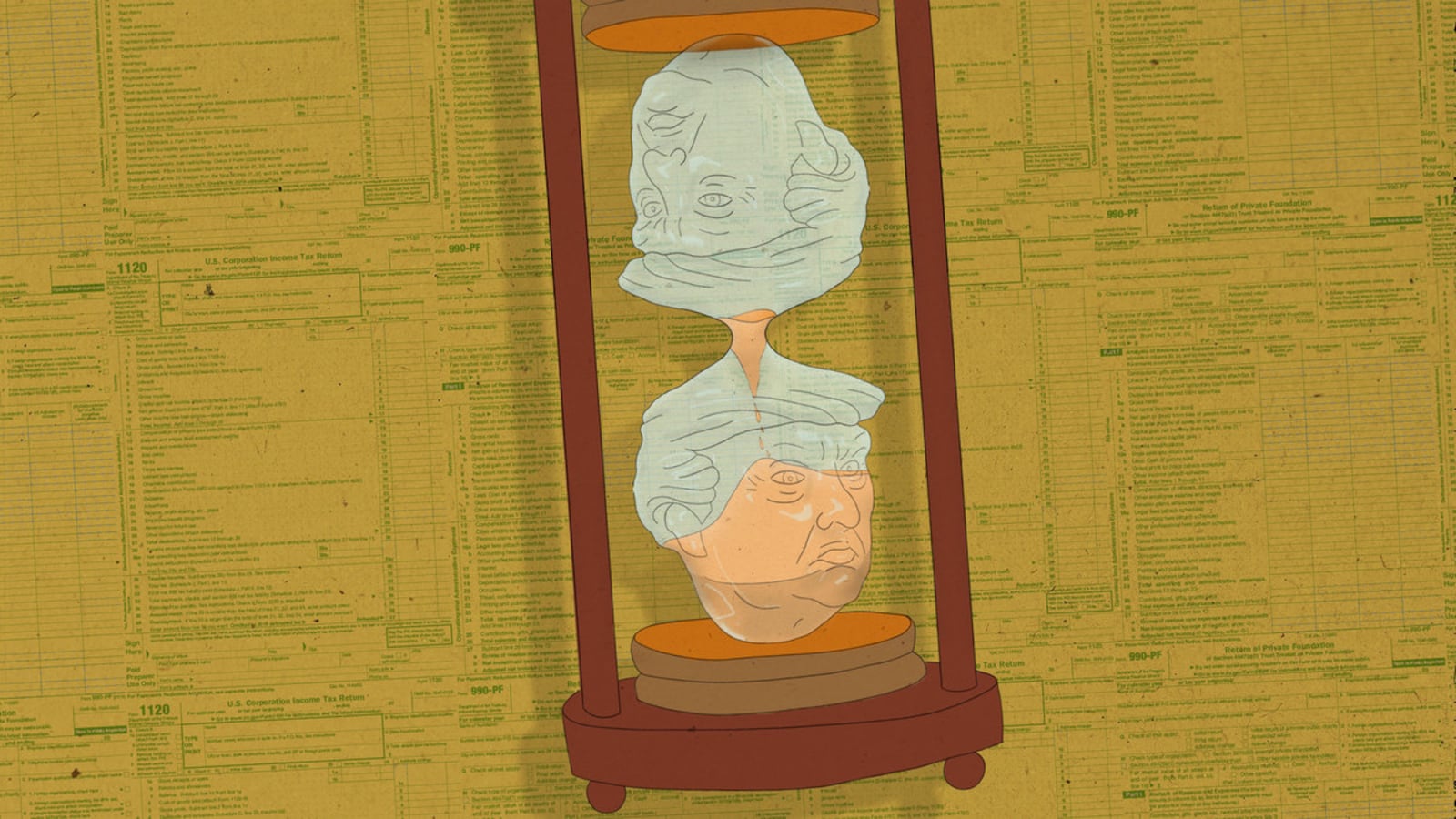Overlooked as the nation was riveted by the opening days of the televised impeachment proceedings was an appeals court decision that started a clock ticking for the Supreme Court to finally pick a side in what Attorney General Bill Barr has called a “scorched earth, no-holds-barred war” between Congress and a president who has categorically refused to cooperate with its investigations into his misconduct.
Unless the Supreme Court acts, Trump’s taxes—which he has fought furiously to keep hidden since beginning his campaign for the presidency— will be turned over to Congress as soon as Wednesday.
Thus, the nation will soon begin to learn whether the Supreme Court’s conservative majority is, as Trump himself hopes, composed of “Trump judges” willing to side with the president in cases where lower courts have shrugged aside the president’s weak arguments for stonewalling investigations into his misconduct.
On Wednesday, the full District of Columbia Court of Appeals refused to rehear an Oct. 11, 2019, decision ordering Trump’s longtime accounting firm, Mazars, to turn over his tax returns and other financial records to the House Oversight Committee. On Friday, Trump made an emergency stay application to Chief Justice Roberts, which he is likely to refer to the full Supreme Court. Therefore, unless five justices vote Trump’s way, the tax returns that Trump has hidden for years could be handed over to the Democratic-controlled House in a matter of days.
Meantime, on Thursday, Trump filed a cert petition asking the Supreme Court to review the decision of a New York federal appeals court requiring Mazars to provide the same financial records to a Manhattan grand jury, although that proceeding will be stayed by agreement of the parties while the case remains pending before the court.
Neither of these cases is expressly about Congress’ pending impeachment inquiry. Nonetheless, the Supreme Court’s response to Trump’s petitions could well signal if the court is willing to provide support and legitimacy for Trump’s sweeping declaration, yet to find acceptance in the lower courts, that the inquiry is “constitutionally illegitimate.”
Indeed, the two cases are reaching the court at a linchpin moment. Trump continues to withhold the testimony of his closest aides from Congress even as he asserts that the evidence of other witnesses should be ignored as “hearsay.” If the Supreme Court fails to support Trump’s categorical stonewalling, his claim that the impeachment inquiry is illegitimate, and with it his rationale for withholding witnesses and evidence, could lose much of its already weakening political, as well as legal, force.
The battle lines have been drawn sharply, both by recent Trump judicial appointees, as well as by Trump’s chief law enforcement officer, and assiduous protector, William Barr.
Only three members of the D.C. Circuit dissented from the full appellate court’s refusal to rehear the Mazars decision. Two of them were Trump’s own appointees: Neomi Rao and Gregory Katsas. Katsas, a former Trump administration official, absurdly asserted that Congress’ subpoena for Trump’s wholly personal business records (many of which predate Trump’s presidency) presents a greater “threat to presidential autonomy and independence” than the subpoena for White House tapes the Supreme Court upheld in United States v. Nixon. Just how obtaining presidential tax returns could threaten the autonomy of the president went unexplained.
In an extraordinary speech on Friday to the conservative Federalist Society, Barr offered a further explanation of what the president believes is at stake. The attorney general declared that the Democratic Party is now part and parcel of a “Resistance” force, engaged in a “war to cripple, by any means necessary, a duly elected government.” According to Barr, the “Resistance” force that now controls the House (that is, duly elected representatives) is rallying “around an explicit strategy of using every tool and maneuver available to sabotage the functioning of [Trump’s] administration.” Barr’s message is clear: Because Trump is the putative victim of an “incendiary” “insurgency” that has declared war on his presidency, the president must be afforded wide latitude in his efforts to resist the “Resistance”—including by outright defying Congress.
Neither of the cases now before the Supreme Court are squarely about the House impeachment investigation. The House issued its subpoena to Mazars before commencing the inquiry, and the lower court decisions addressed the power of Congress to obtain presidential records in connection with normal “legislative” oversight, not impeachment.
Yet Judge Rao (also a former Trump administration official), who dissented from the initial D.C. Circuit panel decision, has made it extremely clear that the president’s battle against impeachment was at the forefront of her mind. Rao endorsed Trump’s wholly baseless claim that he has “due process” rights in connection with the House impeachment investigation. Rao’s “due process” rationale gives rise to an implication that courts could well back Trump’s efforts to stonewall what the White House has declared to be a “constitutionally illegitimate” impeachment inquiry by refusing to enforce impeachment subpoenas on the ground that Trump’s “rights” have been violated.
In their Supreme Court stay petition, Trump’s lawyers echoed Rao’s logic, warning that, “[g]iven the temptation to dig up dirt on political rivals, intrusive subpoenas into the personal lives of Presidents” could “become our new normal in times of divided government.” It is particularly audacious for Trump—who faces impeachment for trying to extort a foreign country into manufacturing dirt on a political rival—to be warning the Supreme Court about the supposed dangers of Congress using formal, legal tools to obtain evidence regarding potential presidential misconduct. But to Trump’s partisans, such congressional intrusions simply cannot be tolerated, given that Congress is, in effect, a battlefield adversary.
In his Federalist Society speech, Barr complained about an “encroaching judiciary” that he claimed has improperly taken it upon itself to resolve “turf disputes between the political branches.” But, as the current litigation before the Supreme Court demonstrates, Trump has no problem asking the federal courts to step in to wholly insulate him from congressional oversight, or from the prying eyes of state law enforcement agencies. In fact, Trump’s clear hope is that he can enlist the Supreme Court as his ally in a battle with the “insurgency,” as his attorney general now calls a duly elected house of Congress controlled by a different political party.







